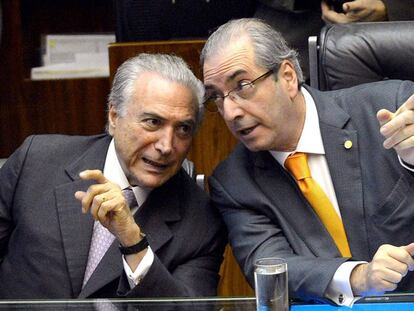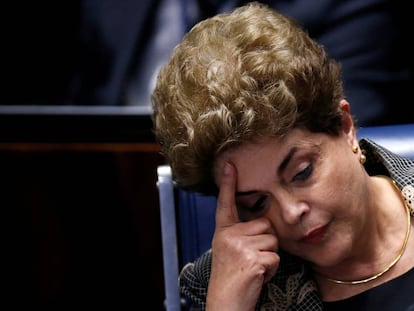Brazil¡¯s outraged opposition calls for scandal-hit Temer to step down
But opponents of unpopular president face uphill battle in their bid for new popular ballot

Opposition forces in Brazil have taken to the streets calling for the new presidential elections in the wake of the release of details of an audio recording in which embattled President Michel Temer can allegedly be heard authorizing the payment of hush money to Eduardo Cunha, the former speaker of the lower house, and who is currently in prison for corruption.
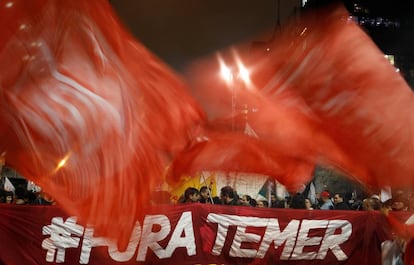
Echoing the calls for change that came in 1984 when tens of thousands of Brazilians demanded the end of the country¡¯s two decades of dictatorship, the opposition ¨C including high-profile figures such as former president Luiz In¨¢cio Lula da Silva of the Workers Party and head of the Sustainability Network (Rede) Marina Silva ¨C have gathered together using the slogan ¡°Diretas, j¨¢¡± (elections now) in response to revelations published in the O Globo newspaper.
Nobody has heard the recording in question, and the government denies its existence. But according to the paper, Temer, who has already said he will not stand down, was secretly taped discussing monthly payments to Cunha to ensure his silence concerning what is widely thought to be his vast knowledge about corrupt dealings prosecutors are now investigating as part of the massive corruption case involving the state oil company Petrobras.
Any popular presidential election now would benefit Lula who is riding high in the polls but faces corruption charges
The publication of the allegations in O Globo has seen the opposition call for the resignation of Temer, who has failed to win the hearts and minds of Brazilians in his year in office. But the holding of a popular ballot to choose a new president is not straightforward, as it would require a change to the country¡¯s Constitution. Currently, the resignation of a president can be followed by new direct presidential elections only if these are approved by Congress and if they take place within two years of the last such vote. But if that two-year period has already expired, as is currently the case, it is the Brazilian Congress who selects and votes on a new candidate.
Opposition forces in Brazil are against this indirect election option because they feel it would compound the problems of legitimacy facing the present administration. Temer is the former second-in-charge under Dilma Rousseff, who was removed from office in 2016 after impeachment proceedings were launched against her by the now-imprisoned Cunha. He therefore came to power without an election having been held.
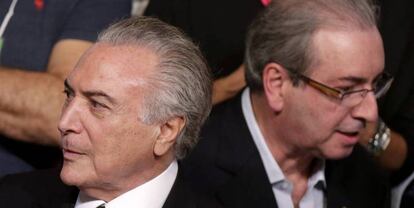
In fact, a petition calling for the Constitution to be amended so that a direct presidential election can be called was lodged in Congress several months ago. A commission to study the proposal was even set up and could be reactivated if the political will was there. The proposal on the table makes provision for the calling of elections 90 days after the president leaves office, thus allowing time for the necessary constitutional reform ¨C a convoluted process that, even if pushed through as quickly as possible, is unlikely to take less than two months.
One of the obstacles in the push for political consensus in Brazil is that any election held now would likely benefit Lula, who is riding high in the polls, but who is also a suspect in five separate investigations. Any final verdict in these cases, including a possible sentence banning him from public office is still a long way off. But if Lula were to win presidential elections, he would enjoy political immunity.
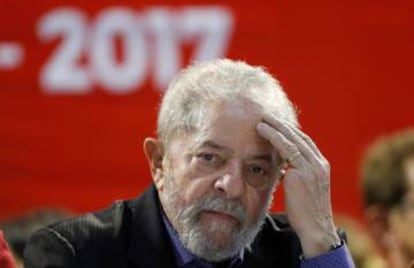
Beyond elections, a second option for the removal of Temer is impeachment ¨C a lengthy process that needs to be approved by the two-thirds of both Congress and the Senate. Alternately, the Supreme Court could, if it finds evidence of criminal wrongdoing on the part of Temer during his time in office, seek approval from Congress to remove him. Again, this would require the vote of two-thirds of both the Congress and the Senate.
There is a third possibility: one that is perhaps the fastest of all. On June 6, Brazil¡¯s Electoral Supreme Court will look at banning Rousseff and Temer from public office over alleged illegal financing during the 2014 presidential campaign. If Temer is slapped with a ban ¨C an outcome that may be unlikely as the tribunal is headed up by a magistrate considered close to Temer ¨C a provisional president would take power. That person would be charged with calling presidential elections within 30 days. Under the present rules, that would be an indirect election, with the Congress making the final decision on who is to run the country.
English version by George Mills.
Tu suscripci¨®n se est¨¢ usando en otro dispositivo
?Quieres a?adir otro usuario a tu suscripci¨®n?
Si contin¨²as leyendo en este dispositivo, no se podr¨¢ leer en el otro.
FlechaTu suscripci¨®n se est¨¢ usando en otro dispositivo y solo puedes acceder a EL PA?S desde un dispositivo a la vez.
Si quieres compartir tu cuenta, cambia tu suscripci¨®n a la modalidad Premium, as¨ª podr¨¢s a?adir otro usuario. Cada uno acceder¨¢ con su propia cuenta de email, lo que os permitir¨¢ personalizar vuestra experiencia en EL PA?S.
?Tienes una suscripci¨®n de empresa? Accede aqu¨ª para contratar m¨¢s cuentas.
En el caso de no saber qui¨¦n est¨¢ usando tu cuenta, te recomendamos cambiar tu contrase?a aqu¨ª.
Si decides continuar compartiendo tu cuenta, este mensaje se mostrar¨¢ en tu dispositivo y en el de la otra persona que est¨¢ usando tu cuenta de forma indefinida, afectando a tu experiencia de lectura. Puedes consultar aqu¨ª los t¨¦rminos y condiciones de la suscripci¨®n digital.
